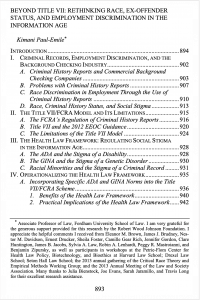Beyond Title VII: Rethinking Race, Ex-Offender Status, and Employment Discrimination in the Information Age
Kimani Paul-Emile, 100 Virginia Law Review 893
In this article, the author argues that the negative impact of employers’ reliance on criminal records databases falls most heavily on Black and Latino populations, as studies show that the stigma of having a criminal record is significantly more damaging for racial minorities than for whites. This criminal records “penalty,” the author continues, limits profoundly the chance of achieving gainful employment, creating new and vexing problems for regulators, employers, and minorities with criminal records. The author expresses that the existing regulatory apparatus in the U.S., which is grounded in Title VII of the Civil Rights Act of 1964 and the Fair Credit Reporting Act, is ill-equipped to resolve this emerging dilemma because it fails to address systematic information failures and the problem of stigma.
This article proposes a new framework drawn from core aspects of anti-discrimination laws that govern health law, notably the Americans with Disabilities Act, and the Genetic Information Nondiscrimination Act. These laws were designed to regulate the flow of information that may form the basis of an adverse employment decision, seeking to prevent discrimination preemptively. More fundamentally, the author argues, they conceptualize discrimination through the lens of social stigma, which is critical to understanding and prophylactically curbing the particular discrimination that results from dual criminal record and minority status. The author asserts that his health-law framework attends to the interests of minorities with criminal records, allows for more robust enforcement of existing laws, and enables employers to make appropriate and equitable hiring decisions, without engaging in invidious discrimination or contributing to the establishment of a new, and potentially enduring, underclass.
